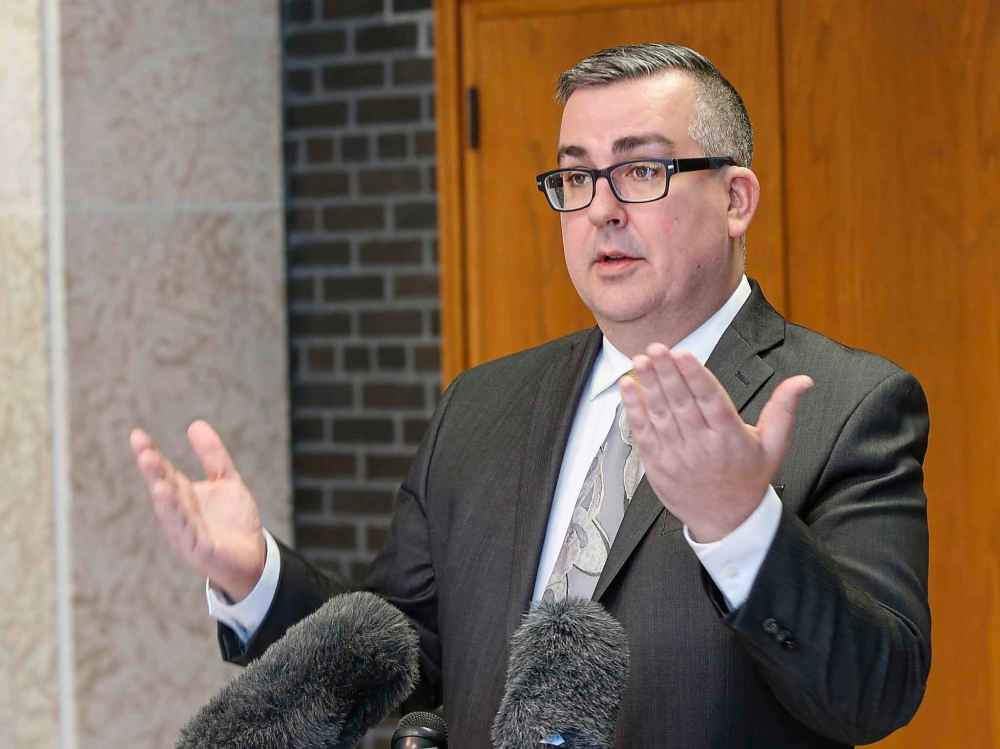Meth task force rolls up sleeves
Advertisement
Read this article for free:
or
Already have an account? Log in here »
To continue reading, please subscribe:
Monthly Digital Subscription
$0 for the first 4 weeks*
- Enjoy unlimited reading on winnipegfreepress.com
- Read the E-Edition, our digital replica newspaper
- Access News Break, our award-winning app
- Play interactive puzzles
*No charge for 4 weeks then price increases to the regular rate of $19.00 plus GST every four weeks. Offer available to new and qualified returning subscribers only. Cancel any time.
Monthly Digital Subscription
$4.75/week*
- Enjoy unlimited reading on winnipegfreepress.com
- Read the E-Edition, our digital replica newspaper
- Access News Break, our award-winning app
- Play interactive puzzles
*Billed as $19 plus GST every four weeks. Cancel any time.
To continue reading, please subscribe:
Add Free Press access to your Brandon Sun subscription for only an additional
$1 for the first 4 weeks*
*Your next subscription payment will increase by $1.00 and you will be charged $16.99 plus GST for four weeks. After four weeks, your payment will increase to $23.99 plus GST every four weeks.
Read unlimited articles for free today:
or
Already have an account? Log in here »
Hey there, time traveller!
This article was published 27/03/2019 (2451 days ago), so information in it may no longer be current.
The tri-government task force that’s compiling recommendations on how to tackle Manitoba’s mounting meth problem has “quite a number” of suggestions, but isn’t ready to release them yet.
Michael Jack, co-chairman of the illicit drug task force working group that was struck in December, said the 17-member committee has met formally three times and struck three subcommittees, which meet more often.
The subcommittees are focused on making recommendations on prevention and education (one), treatment options (two) and disruption of supply and enforcement (three).

Their members include Winnipeg Police Service officers, RCMP, Winnipeg Fire and Paramedic Service members, public health officials and non-profit executive directors, all of whom were appointed by the city, provincial and federal governments.
Winnipeg Mayor Brian Bowman, Manitoba Health Minister Cameron Friesen and Liberal MP Robert-Falcon Ouellette are on the task force’s oversight committee. They will receive the working group’s final report in June.
“So, among the three subject areas, we have generated already quite a number of recommendations, but we’ve got a lot of work to do,” Jack said Wednesday.
“Everyone involved acknowledges that we’ve got a fairly compacted time period within which to canvass everything that’s already been done. It’s important to us to not be reinventing the wheel or covering ground where other very qualified people and groups of people have already been studying and making recommendations.”
Jack, who is the chief corporate services officer with the City of Winnipeg, wouldn’t provide an estimate of how many recommendations have been compiled thus far, as they haven’t been finalized. But he acknowledged the speed at which the task force is trying to work, within a six-month window to fight a problem widely referred to as a “meth crisis.”
Manitoba’s meth issues have Ottawa’s attention, thanks in large part to Ouellette bringing them up frequently in caucus, Prime Minister Justin Trudeau said during a visit to Winnipeg Tuesday.
“This is a situation that is devastating for so many families on all sides of this issue. We know we need to do a better job in all levels of government to respond to this, to restore confidence in our communities and get people on the path to wellness,” Trudeau said.
Trudeau and Ouellette pointed to recent funding announcements as ways the federal government is helping quell the crisis, which include boosts to the RCMP and the Canada Border Services Agency, to beef up security and stop illicit drugs from entering the country.
Ouellette said he expects next steps may include changes to the Criminal Code.
“The question is how long can we keep someone? If someone has an addiction issue obviously, (and) the health-care system is unable to respond for whatever reason, are there other measures that we can be doing?” he asked. “What are we doing in the justice system itself to make sure that someone, when they leave criminal corrections institutions, is going to be successful in their re-integration in society? Or are they going to go fall back to the drugs? These are the types of things the federal government can deal with.”
The Winnipeg Centre MP also suggested people with addictions need more secure, quickly available facilities where they can stay and receive treatment.
“I don’t think it should be a jail, but I think there should be a place that’s not the emergency ward people are going to. It should be someplace specific perhaps, is what I’m hearing from a lot of individuals, where they get immediate treatment if they so desire — that they don’t have to wait seven months to get a bed,” Ouellette said.
He compared Manitoba’s meth crisis to the national opioid crisis “times four” and said he’s “a little bit nervous” for summertime, when more people will be out in the streets and violence could surge downtown.
jessica.botelho@freepress.mb.ca
Twitter: @_jessbu
History
Updated on Wednesday, March 27, 2019 6:23 PM CDT: Adds missing info to box


